Lawyers for Justice in Libya (LFJL) and the Cairo Institute for Human Rights Studies (CIHRS) welcome the condemnation of to the destruction of Sufi religious sites in Libya by three of the United Nations’ (UN) independent experts, including the Special Rapporteur on Freedom of Religion and Belief, the Special Rapporteur on Cultural Rights, and the Independent Expert on Minority Issues. The UN response follows an urgent appeal issued jointly by LFJL and CIHRS on 31 August, 2012 that raised concerns regarding ongoing violations to the rights of the Libyan Sufi minority to freedom of religion and belief, the arbitrary detention of protesters and journalists, and the alleged complicity of the Supreme Security Council of the Libyan government (SSC) in these human rights violations.
The joint urgent appeal by LFJL and CIHRS came as an immediate response to attacks on Sufi religious sites in August, 2012, which led to the destruction of several shrines, including the prominent Al-Sha’ab Mosque in central Tripoli and the Sidi Abdul-Salam al-Asmar al-Fituri mosque, located in Zliten, in addition to tombs of Sufi religious leaders and even libraries. Notably, in several places this destruction took place while Libyan security forces looked on and took no action to stop the attackers.
The continuing persecution of the Sufi minority in Libya, including violations of their right to freedom of religion, remains alarming, particularly in light of the Libyan government’s inaction to secure vulnerable religious sites, to protect the Sufi religious minority and ensure its right to freely exercise their religious beliefs and rituals, to ensure the security of those seeking to protest peacefully, and to hold accountable those responsible for such crimes.
LFJL and CIHRS call upon both the UN and the Libyan government to take immediate, proactive, and comprehensive measures in order to halt these developments, to ensure accountability for human rights violations, and to guarantee the non-recurrence of such attacks.
Share this Post

